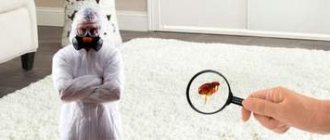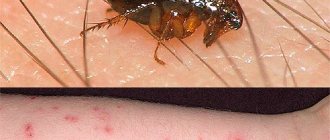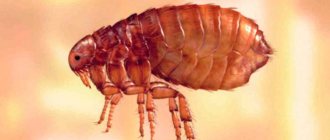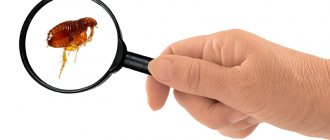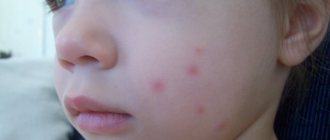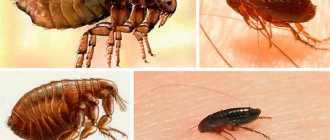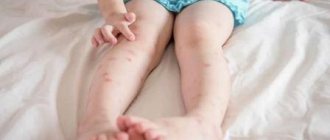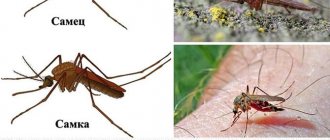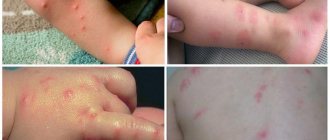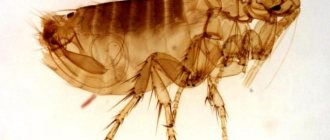- Fleas attacking humans
- Dangerous types of parasites
- How a flea bites through skin
- What do bite marks look like?
- The danger of flea bites for people
- How to protect yourself from insects
- Preventive measures against fleas
Like other blood-sucking insects, fleas feed only on blood. The structure of the oral apparatus does not allow them to use other food. Therefore, the answer to the question whether fleas can bite humans will be positive. People are willingly bitten even by those that parasitize other warm-blooded animals: cats, dogs, rodents or birds. But there is a species that specializes specifically in humans - this is the human flea.
Fleas attacking humans
People are usually bitten by fleas that live on pets. They transfer to humans from the fur of pets. But these species prefer the blood of their primary hosts for the following reasons:
- The body temperature of animals is higher than that of humans;
- they are covered with fur, where it is easy to hide;
- The animal's skin is easier to bite through.
When the host is not around, the hungry parasites attack people.
Human fleas are adapted to live in human homes. Their mouthparts are designed to bite through the skin of humans, although in rare cases they also bite small animals.
These insects do not live on a person constantly, like lice, they attack him, get drunk with blood and leave the body. The rest of the time, parasites live under baseboards, in floor crevices and other secluded places. Their body length reaches 3 mm, which is longer than that of insects living in animal fur.
Traces after the attack
How fleas bite is shown in the photo below. Insects jump well in height and length, but they bite the legs and feet of a sleeping person. Especially if your feet are without socks, trousers, or other clothes.
The way a flea bites is like being pricked by a thin needle, but the sensation comes a little later. During a bite, the insect injects a special substance under the human skin that prevents blood from clotting. After a meal, characteristic marks remain at the site of flea bites:
- small red inflamed spots appear on the body;
- dried blood in the center;
- with a large number of parasites, several small spots merge into one large one;
- all this is accompanied by severe itching and minor pain.
Dangerous types of parasites
In addition to human fleas, people are exposed to flea bites of the following types:
- Canine. They bite especially often due to the fact that a large number of parasites live on dogs. These animals easily become infected with fleas on the street and pass them on to people. Parasites enter the human body when he comes into contact with an animal. It is enough to pet a stray dog for the fleas to cling to the clothes, after which they are brought home.
- Feline. This type of parasite is found throughout the world. They willingly settle and breed in apartments. In the absence of cats, fleas attack people.
- Rat. The most dangerous species, whose representatives carry deadly infectious diseases. They are rarely found in cities and bite rural residents.
- Rabbit. They are also a common species, but they bite people less often.
Any flea that finds itself on a human body will bite, regardless of what species it belongs to. Even those that parasitize mice or birds are capable of biting through the skin. A bloodsucker that attacks a person bites him 1 to 3 times. He leaves the body when he is satisfied.
Symptoms and consequences of flea bites in humans
- acute pain at the time of the bite;
- more noticeable itching after bites;
- the occurrence of small tumors;
- there is a red dot at the site of the bite - dried blood;
- There is red skin around the bite.
The consequences of such bites can be disastrous for humans. An allergy to flea bites can lead to fever and swelling.
Increased body temperature, difficulty breathing, diarrhea, and in rare cases anaphylactic shock are typical for children under 12 years of age and allergy sufferers.
Read on topic - Allergy to bedbug bites - body reaction, symptoms and treatment methods
Parasites are capable of transmitting various infectious diseases, including:
- tick-borne encephalitis;
- salmonellosis;
- trypanosomiasis;
- hepatitis B, C;
- tularemia;
- anthrax.
Transmitted mechanically or through blood.
Flea development
How a flea bites through skin
The insect has long jaws that, when folded, resemble a needle. The flea pierces the skin with them, reaches the capillaries and drinks blood. The blood vessels are located deep, and to reach them, the insect inserts its head and part of the body into the tissues of the body. When the parasite sucks blood, it assumes an upright position.
Like other blood-sucking insects, when bitten, along with saliva, a flea injects a composition into the victim’s tissues that prevents the blood from clotting. This makes the process of sucking it out easier. Unlike mosquitoes, it does not inject an anesthetic into the frame, and when a flea bites a person experiences a sensation reminiscent of a needle prick. But thanks to its strong chitinous shell, the insect is not afraid of blows and scratching of the bitten victim.
Causes of flea infestations and locations of dislocations
The sources of insects are often:
- Damp basements;
- Neighboring apartments with pets whose owners are in no hurry to get rid of parasites;
- Mice and rats;
- Animals, not only dogs and cats, but also poultry;
- A person who can bring them from the street on clothes.
As soon as earth fleas appear in the house, they immediately spread to secluded places on the floor (behind baseboards, between parquet boards, under carpets, and dog bedding is their favorite place).
What do bite marks look like?
Flea bites have the following characteristics:
- The parasites bite the legs of a sitting and standing person, and the neck and arms of a sleeping person;
- after a bite, a swelling forms on the skin with a point where the skin is damaged;
- Next to the mark there are usually one or two more, since the flea sequentially bites the skin in 2-3 places located at a short distance from each other.
The itching and pain from flea bites is superior to mosquito bites. They don't take long to heal. But not all people are equally sensitive to damage caused by fleas. Some people wonder why insects bite them and others don’t. This impression is deceptive, since fleas do not select victims according to any criteria. They bite everyone, but not every person feels pain from the bites.
What to process
Probably the most unpleasant consequence of a flea bite is acute itching, which causes severe discomfort. In addition, there is a possibility of infection, which often occurs when scratching the bite site. To reduce the likely risks, it is recommended to think about how to get rid of the consequences of a flea bite .
To eliminate unpleasant sensations, you can use pharmaceutical or folk remedies. However, it is recommended to use the latter only for the treatment of single skin lesions.
Before treating a large number of flea bites on a person, it is recommended to consult a doctor, because in such cases there is a high risk of developing allergic reactions.
Folk remedies
The folk medicine cabinet is replete with a variety of different recipes designed to relieve the unpleasant symptoms of flea attacks.
To quickly relieve swelling, irritation, and prevent the development of inflammation, it is recommended to use:
- Agave. Cut one leaf of agave, also called aloe, lengthwise, after washing it and removing the thorns. After this, you should thoroughly wipe the wound with freshly squeezed juice. If small pustules appear, you can bandage the sheet to the affected area using a soft bandage.
- Soda. To prepare a medicinal solution, mix one spoon of baking soda in a glass of water. Next, soak a piece of gauze or bandage generously with the resulting solution and apply the resulting compress to the wound.
- Green tea. The simplest remedy that will help eliminate the unpleasant symptoms of bites is a bag of drunk green tea. To carry out the treatment procedure, it is enough to apply a warm bag to the wound, and then secure it with a soft bandage. Keep it until the itching is completely eliminated.
- Calendula. Calendula lotions will help disinfect the wound and have an anti-inflammatory and calming effect. To prepare the decoction, you need to brew two tablespoons of dried inflorescences with a glass of water and leave until cool. Use the prepared solution as a basis for wet compresses.
If the use of folk remedies does not bring the expected result, it is recommended to abandon their use in favor of medications.
Pharmacy drugs
On the modern pharmaceutical market there are many effective remedies for flea bites. To choose the right one, it is important to familiarize yourself with the contraindications and indications of a particular medicine.
The following are especially often used to eliminate inflammation and itching:
- Boro plus. Soft cream for flea bites. It has a pleasant scent and has a quick soothing effect on the skin. This drug has a wide spectrum of action, softens the skin, and has an anti-inflammatory effect.
- Fenistil gel. A particularly popular product. Quickly relieves itching, soothes, and has a mild analgesic effect.
- If small pustules appear on the skin, it is recommended to regularly treat the skin with levomekol ointment until they disappear completely. The product should be applied precisely to the area where the skin is affected by the flea.
Before applying medicine against flea bites, it is recommended to pre-treat the affected area with any antiseptic, such as hydrogen peroxide. This measure will help reduce the risk of wound infection.
Special preparations
If fleas bite, you can get rid of the unpleasant consequences of a flea attack with the help of special medications that have effective properties.
These include, for example: hydrocortisone ointment, flucinar. These medications have potent properties, helping to quickly eliminate the unpleasant symptoms of a bite. They can be used only if there is no risk of developing allergic reactions.
If there is a suspicion of infection by a flea with a certain disease, against the background of severe suppuration, the development of inflammation or other severe symptoms, you should immediately visit a doctor.
Untimely contact with a specialist or lack of adequate treatment can lead to infection entering the systemic bloodstream, the development of sepsis, and toxic damage to the body.
The danger of flea bites for people
Fleas are dangerous insects that can cause great harm to their victims. Their bites lead to the following diseases:
- Allergy to blood thinning enzyme. This is severe itching and redness at the site of the bite, lasting for several days, and a rash all over the body. In severe cases, the lymph nodes become enlarged, body temperature rises, angioedema and anaphylactic shock occur.
- Causative agents of dangerous diseases that enter with saliva. Fleas carry deadly infections: typhus, salmonellosis, plague.
- Helminth eggs. Parasites infect humans with tapeworms, pumpkin tapeworms and other helminths that enter the body through a bite.
- Wound infection. When scratching, an infection enters the bite site and the wounds fester.
Fleas pose a great danger to children and pregnant women. Children who love to play with pets are especially often bitten by these parasites. Children scratch the bites, which causes them to become infected and take a long time to heal.
To reduce pain and prevent infection, bite marks are treated with preparations containing alcohol. If signs of allergy appear, take antihistamines. If swelling and other manifestations of strong reactions appear, then seek medical help.
Actions after a parasite attack
Insect bite
What to do if you are bitten by fleas, what to anoint your feet to relieve the itching. In most cases, traces of the attack disappear on their own within a week. The itching gradually disappears within 3 days. However, each organism is an individual system, for some it is a minor itch, while for others they cannot find a place for themselves.
On a note!
Children instinctively smear the bite sites with saliva, and the unpleasant sensations immediately disappear. Saliva is a strong antiseptic. And if you don’t have anything at hand, you can use this method.
There are many recipes for applying what to apply to ease your skin condition. Folk remedies and pharmaceutical preparations are used. The choice of the appropriate drug depends on the complexity of the situation.
- Disinfect wounds with medical alcohol or any alcohol tincture. Calendula, valerian, motherwort help well.
- Treat sore spots with baking soda paste. Baking soda is slightly diluted with water to a paste. Apply to the skin. The product kills germs, disinfects the wound, and eliminates itching.
- Green tea is a strong antiseptic. Apply a bag after brewing, or moisten cotton wool in the brew, and treat the affected areas. You will have to do this several times during the day.
- Zvezdochka balm helps a lot. It contains about 25 medicinal herbs. The product helps cope with unpleasant external symptoms and promotes tissue regeneration. It is necessary to lubricate several times a day.
- Bepanten ointment restores the skin. Allowed for use by children from birth. But it does not eliminate the itching.
- In case of severe itching, you can treat with Fenistil-gel. The product stops the allergic reaction, removes all unpleasant symptoms - itching, swelling, redness. Apply twice a day.
How to protect yourself from insects
There is an opinion that fleas are found only in cluttered rooms where the floors are not washed for a long time. This is not true; parasites thrive in clean places. But still, they prefer to live where there are a lot of old things and where to hide.
Fleas live a long time, up to one and a half years, and manage to lay 2000 eggs. Reproduction occurs in geometric progression, and if a couple of these insects get into the house, very soon a crowd of hungry parasites will appear there.
To get rid of fleas, perform general cleaning. Vacuum all surfaces, wash floors with water with the addition of ammonia, carefully treating areas in corners and near baseboards.
But parasites cannot be removed with just washing the floors; on the contrary, they like a warm and humid environment. To exterminate insects, it is necessary to use insecticides in the form of aerosols and powders. Pets are treated with special products, their bedding is cleaned or changed. The room is sprayed with aerosol preparations or powders are scattered.
The basements of multi-story buildings often become breeding grounds for fleas, from where they penetrate into apartments. To get rid of parasites, you will need the help of a sanitary and epidemiological station.
Why fleas don't bite everyone
It turns out that not all people are bitten by fleas. For example, a family of several people, but only one is bitten. There are a couple of theories to explain this phenomenon.
Theory one – “Blood”
Fleas prefer one blood type and Rh factor more than another. A high sense of smell helps determine a person's blood type. They found that the first blood group (the sweetest) attracts parasites the most, while the third and fourth blood groups are not even touched.
Theory two – “Skin”
Not all fleas are able to bite through human skin in such a way as to reach a vessel and drink blood. Therefore, they choose people with thin skin and attack.
Theory three – “Body”
Fleas choose people with a high temperature or a detected sweat odor. They bite mainly in places where sweat is secreted.
This is not to say that all these theories are one hundred percent correct. After all, each person is individual, treats and reacts to bites differently. Some people get used to it and don’t notice the bites. Others become blistered and develop an allergic reaction. For this reason, any theory has a right to exist.
Preventive measures against fleas
The following steps will help keep jumping bloodsuckers out of your home:
- Regularly check the condition of pets, put flea collars on them and treat them with flea products.
- Maintain cleanliness and order in the home, avoid cluttering with old things.
- When going out into nature, they use powerful anti-mosquito repellents, which they spray on their hands and feet. This will repel fleas perfectly.
- Twigs of wormwood placed around the house have the same effect on parasites.
Fleas are dangerous blood-sucking insects that attack people and animals. Parasites that enter human habitation multiply quickly and are difficult to remove. To prevent the appearance of fleas, keep the house clean and carry out preventive measures.
Top 5 most effective self-treatment products
- An aerosol like dichlorvos is the smelliest and most ineffective product (from the last century). Today there are more effective and virtually odorless products. dezbox recommends: Get Total, Get Express, Medilis Zipper, Delta Zone - these are concentrates for self-fighting. These are modern, popular and effective flea medications. Before you start processing, you need to put on a respiratory mask. Children and pets must leave the premises. It is necessary to spray all baseboards, furniture, interior surfaces of cabinets, bedding, and clothing. After treatment, close windows and doors for several hours;
- Flea whitening is an inexpensive remedy for self-treatment of a room;
- Vinegar, cologne. This mixture intoxicates fleas. The mixture should be used to treat baseboards, carpeting, and all cracks.
- Freezing. A radical method, feasible in winter. When the frost is -20 degrees, open all the windows and cool the room.
- Wormwood, tansy eucalyptus. You should infuse the herbs for 10 hours, pour them into a spray bottle and spray the entire room. The strong smell of herbs will help get rid of parasites.
- Garlic. Fleas don't like the smell of garlic. Peeled slices placed indoors will drive away parasites.
We also recommend reading - How effective is dichlorvos against bedbugs - TOP 5 most popular brands of dichlorvos
Folk remedies against earthen fleas
Traditional methods of control have been used for many years; they were effective before the advent of chemicals and continue to be used to this day. It is important to understand that many of them have lower effectiveness and therefore require repeated or regular use. You also need to remember that some of them can be hazardous to health.
Soda with salt
They are mixed equally, then this simple and safe mixture is sprinkled on all surfaces with pile. Fleas do not live on smooth surfaces; they hide in carpets, upholstered furniture, on dog or cat bedding, etc. All such things in the house should be completely covered with this soda-salt mixture and left for 10 hours. Then everything needs to be vacuumed very thoroughly to remove salt and soda, and at the same time dead fleas. This procedure will not kill all the fleas in the house the first time, so it is repeated after a couple of days.
Pine aromas
They are unpleasant to fleas and many other pests. Twigs of coniferous trees should be placed around the house and regularly replaced with fresh ones. Drying pine needles are no longer so fragrant. This product is not intended to kill insects, but only to repel them.
Tansy and wormwood
Two plants that are used to control many insect pests. They have a very strong specific smell that fleas cannot stand. Bunches of wormwood or tansy were always mixed in houses or premises where livestock lived. These plants contain a high content of essential oils, which reliably repel insects.
You can prepare a decoction of wormwood and tansy by taking two tablespoons of dry crushed plants (you can take any parts: flowers, leaves, stems), add two glasses of water, bring to a boil in a water bath, then leave for 4 hours to make the decoction insisted. This decoction is used to spray or wipe surfaces.
They also use wormwood tincture, which can be purchased at a pharmacy or veterinary clinic. The tincture is used to treat the fur of dogs and cats to remove fleas.
Other plants
Not only wormwood and tansy are unpleasant to insects. Thyme, mint, eucalyptus, geranium and other plants with a strong aroma can be used to repel. It is important that they are not dried out or wilted, as the aroma that only fresh plants exude scares insects.
Turpentine and kerosene
Fleas do not eat anything other than blood, so it is impossible to poison them, like ants, for example. You can only act against them through a breathing apparatus. Strong, pungent odors repel them. Turpentine and kerosene have a very pungent and unpleasant odor. They are sprayed where fleas may be hiding, the amount of liquid should be sufficient to penetrate, for example, into cracks in the floor or walls. But it is important to remember that these are flammable liquids, which can also negatively affect human health. Therefore, it is necessary to observe safety precautions when working with them. It is also important, after removing fleas using this method, to thoroughly wash the surfaces to remove any remaining product without a trace.
Ammonia
It has a very strong odor that fleas cannot tolerate. You can simply pour ammonia into cracks in the floor or walls, behind baseboards and other secluded places where parasites hide. Second use option: add 20 drops of ammonia to five liters of water and treat all smooth surfaces with this solution or spray it on upholstered furniture, carpets, etc. When washing dog bedding, add a few drops of ammonia to the water.
Essential oils
These are not the most effective means of removing parasites, but they can help keep them out of your home. Oils with strong odors are best used not to combat parasites, but to prevent the appearance of fleas in the house. Lavender, lemon balm, cloves, and wormwood are suitable for this purpose. Attention, you must remember that in high concentrations, odorous oils can cause headaches and other unpleasant reactions in people.
Garlic and brewer's yeast
Ten parts garlic is mixed with one part yeast. It turns out a strongly odorous mixture that is laid out in places where fleas have been noticed. Usually a day is enough for the pests to disappear. Attention: Under no circumstances should this mixture be made available to children or pets.
Borax
This product is a salt of boric acid. It is safe for humans and is even used as a cleaning agent. Borax in small concentrations is also not dangerous for pets. But almost all insects cannot tolerate borax. It is sprinkled on upholstered furniture, carpets, and smooth surfaces. Fleas carry these small crystals throughout the apartment, including taking them to hard-to-reach places, where they die.
Fleas on dogs
Dog fleas cause a lot of trouble. You need to take a close look at your pet to understand that he has dog fleas. It is not immediately possible to notice dog parasites, since dog hair is long and fleas have the opportunity to hide from view. To identify dog fleas, you need to observe the dog's behavior. Due to constant bites, the dog becomes unhappy, has sudden mood swings, and it itches, as the skin experiences frequent itching.
If you suspect the presence of dog parasites, examine the animal yourself:
Prevention measures
Sometimes the appearance of fleas is purely an accident. Such sources cannot be excluded in any way, but the chances of parasite penetration can be reduced. And here, banal household hygiene remains an effective preventive measure - regular wet cleaning, beating carpets, airing. It is especially important to avoid clutter and neglect. After all, in a clean and well-kept home, even a flea that suddenly appears will not stay long.
If your family has pets, carefully monitor their health, bathe and brush them regularly. For pets that often visit the street, purchase anti-flea collars and use insecticidal shampoos in their care. It is important to promptly treat already infected four-legged animals.
Fleas have inhabited our planet for many millions of years. There’s definitely no point in doubting their evolutionary progress, just as there’s no point in downplaying the anxiety from their neighborhood. Hardy, invulnerable and fast insects will not easily retreat from the occupied territory. Therefore, when you first detect an enemy, do not wait for the colony to grow, but immediately begin to fight.
